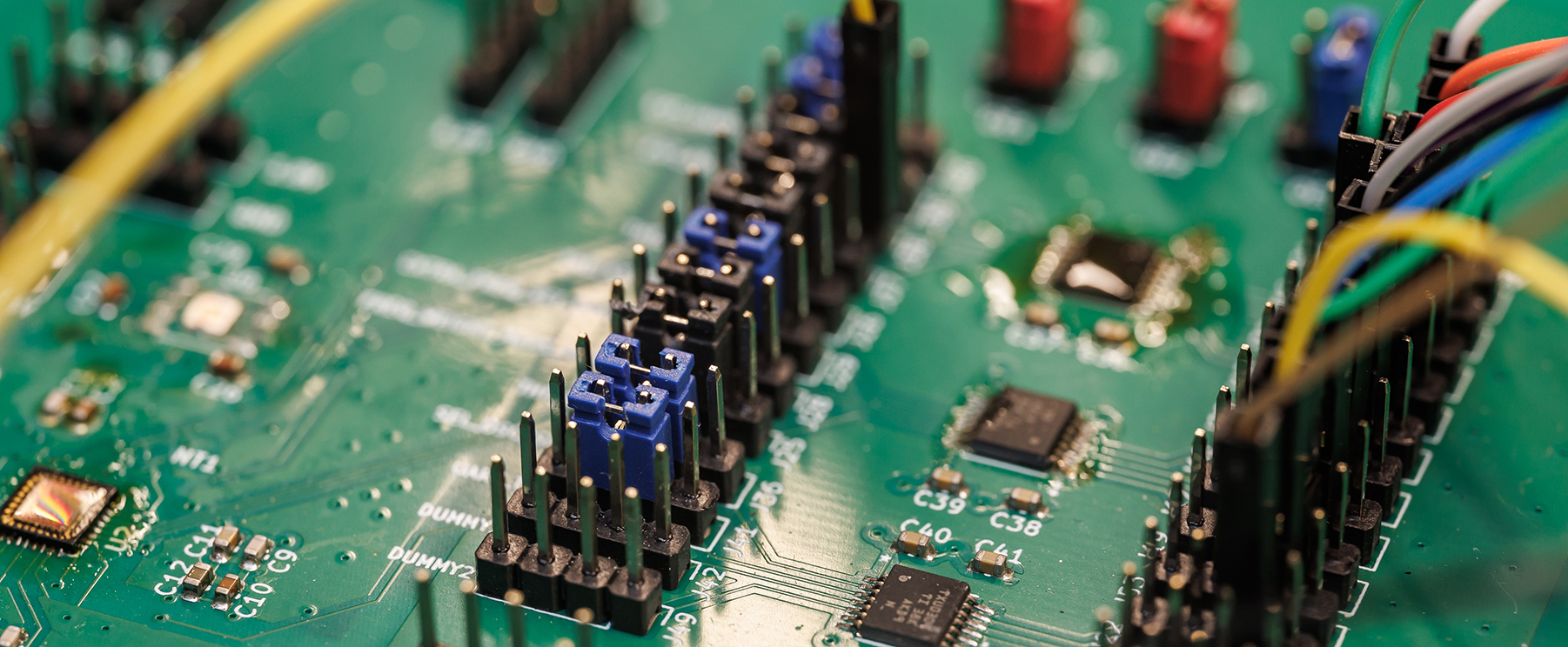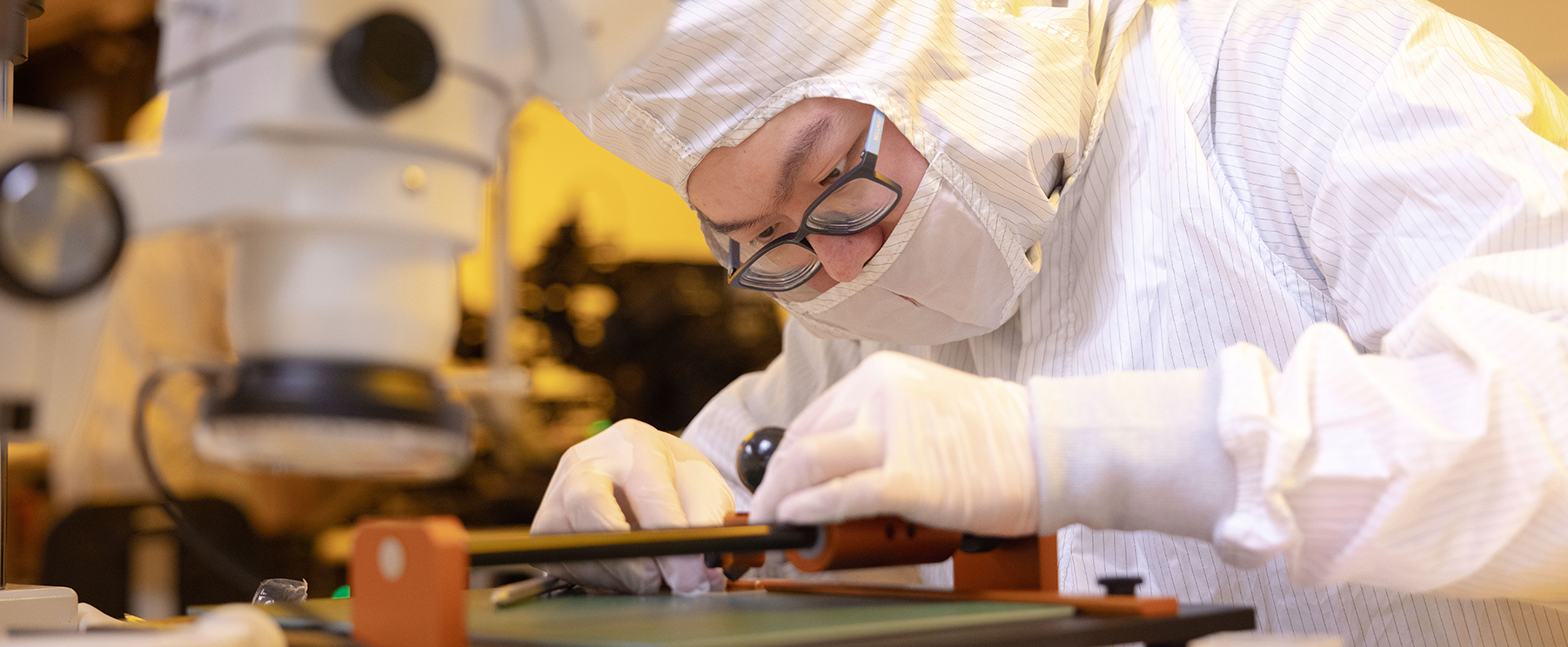Research Areas
Electrical & Computer Engineering

At Yale's Department of Electrical & Computer Engineering, we're driving technological innovations that shape our digital future. Our research spans from the tiniest microchips to global communication networks, encompassing the devices, systems, and algorithms that power our modern world. Here, students and faculty collaborate to solve real-world challenges, creating technologies that will define the coming decades. Whether it's developing next-generation computing platforms, advancing sustainable energy solutions, or pioneering breakthroughs in artificial intelligence, our work pushes the boundaries of what's possible.
Computer Engineering

Designing Intelligent, Secure, and Efficient Computing
From reimagining the fundamental architecture of processors to developing AI systems that mimic the human brain, Yale engineers are designing solutions that promise to reshape the landscape of computing.
Our researchers are developing asynchronous systems that break free from the constraints of traditional clock-driven designs. These innovations pave the way for computer systems that are not only more energy-efficient but also capable of handling complex tasks with unprecedented speed and reliability. Complementing this work, the department is at the forefront of neuromorphic computing, developing both algorithms and hardware for electronic neural networks that draw inspiration from the intricacies of biological brains. This bio-inspired approach is opening new avenues for machine learning and AI that are more adaptable and energy-conscious than ever before.
Yale researchers are also addressing security concerns by creating hardware-level protections. By developing novel cryptographic implementations and exploring the physical properties of computer components, they are fortifying our digital infrastructure against emerging threats. This research extends from the tiniest mobile devices to sprawling cloud computing networks, ensuring that our increasingly connected world remains secure and trustworthy.
Yale's computer engineering innovations are laying the groundwork for more efficient data centers, smarter edge devices, and AI systems capable of learning and adapting in real-time. Their ongoing efforts are helping to shape a future where computing is not just more powerful, but also more secure, energy-efficient, and trustworthy.
Associated Faculty
Nanodevices

Innovating at the Nanoscale
At the nanoscale frontier, Yale's Department of Electrical & Computer Engineering is innovating the future of technology, merging quantum physics, materials science, and artificial intelligence to create devices that defy conventional limits. From pioneering work in quantum optics to breakthroughs in wide-bandgap semiconductors and explorations of quantum geometry in materials, Yale researchers are pushing the boundaries of what's possible in nanodevice engineering.
Teams are mastering photon-photon and photon-spin interactions, laying groundwork for quantum signal transduction. Innovations in III-nitride materials are revolutionizing solid-state lighting and power electronics. Meanwhile, researchers are bridging materials science and AI, developing intelligent sensors and exploring computational spectroscopy. Complementing these efforts, Yale engineers are advancing next-generation optoelectronic materials for energy, sensing, and information technologies. They employ high-throughput methods to create novel semiconducting materials and transform them into electronic devices, while using cutting-edge spectroscopies to explore their electronic and optical properties. These insights enable novel device concepts and push performance limits in photodetectors, solar cells, LEDs, and lasers.
This confluence of expertise is birthing technologies that could redefine computing, communications, and energy systems. The ripple effects of Yale's nanodevice research are already impacting the real world. Faculty-founded startups are translating quantum dots and advanced LEDs from lab concepts to market-ready products. These innovations promise to enhance everything from display technologies to data transmission.
Yale's nanodevice research aims to define the next technological advancements–where quantum computers solve complex problems in seconds, where flexible electronics conform to any surface, and where light itself becomes a precision tool for communication and sensing.
Associated Faculty

Jung Han
William A. Norton Professor of Electrical & Computer Engineering

Claudia Cea
Assistant Professor of Electrical & Computer Engineering

Liangbing Hu
Carol and Douglas Melamed Professor of Electrical & Computer Engineering & Materials Science

Mengxia Liu
Assistant Professor of Electrical & Computer Engineering

Hong Tang
Llewellyn West Jones, Jr. Professor of Electrical & Computer Engineering

Fengnian Xia
Tso-Ping Ma Professor of Electrical & Computer Engineering
Systems

Revolutionizing Networks and AI to Solve Global Challenges
Yale's Department of Electrical & Computer Engineering stands at the cutting edge of systems research, weaving together diverse threads of innovation across a broad spectrum of disciplines, from intricate control algorithms to nature-inspired sensing technologies.
In the realm of networks and communication, Yale engineers are redefining the boundaries of efficiency and reliability. Their work on advanced scheduling algorithms and network control policies is laying the groundwork for next-generation wireless systems and sensor networks. These innovations could revolutionize how we manage and optimize complex communication infrastructures for years to come.
Yale engineers are advancing biomimetic sensing, unlocking nature's secrets to revolutionize how machines perceive the world. By drawing inspiration from nature's most sophisticated sensory systems, researchers are developing intelligent sensors that could transform fields ranging from robotics to medical diagnostics. These bio-inspired technologies offer new paradigms for perceiving and interpreting the world around us.
The department's focus on data analysis and AI is opening new frontiers in how we process and utilize information. From untangling the complexities of high-dimensional datasets to making large AI models more accessible, faster, and secure, Yale's work in this area is democratizing advanced technologies and paving the way for more intelligent, adaptive systems.
Yale's systems research is helping to create a better, more interconnected world by creating more resilient networks, smarter cities, and technologies that respond intuitively to human needs and solve complex global challenges.
Associated Faculty

Ronald Coifman
Sterling Professor of Electrical & Computer Engineering

Anna C. Gilbert
John C. Malone Professor of Electrical & Computer Engineering

Dionysis Kalogerias
Assistant Professor of Electrical & Computer Engineering

Roman Kuc
Professor of Electrical & Computer Engineering

Boris Landa
Assistant Professor of Electrical & Computer Engineering

A. Stephen Morse
Dudley Professor of Electrical & Computer Engineering

Leandros Tassiulas
John C. Malone Professor of Electrical & Computer Engineering



